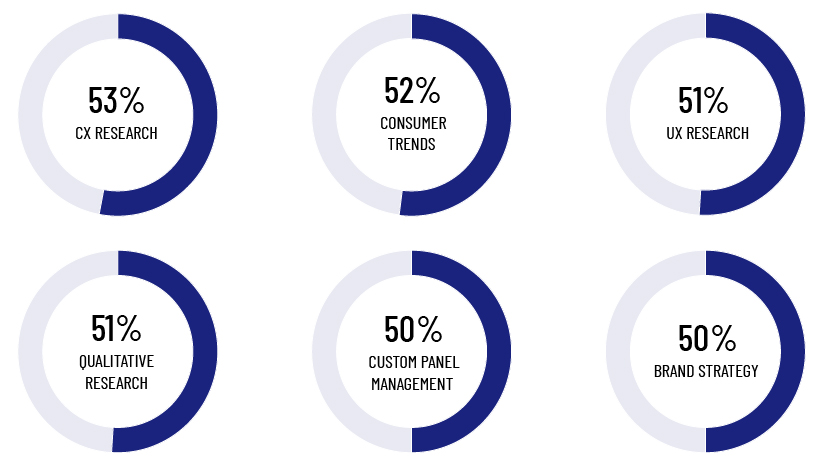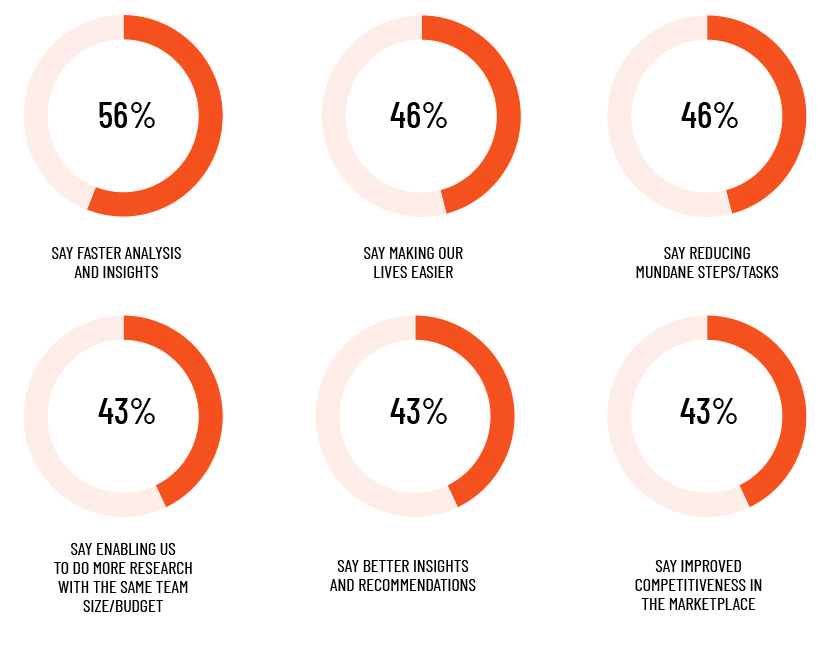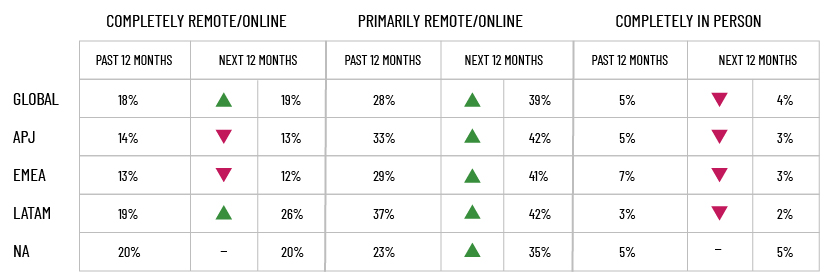Published on January 2, 2024 by Akanksha Singh
Introduction
The market research landscape is ever-evolving, driven by technological advancements and changes in consumer behaviour and the world economy. A report from The Business Research Company indicates that the global market research services market grew to USD83.93bn in 2023 from USD81.13bn in 2022, at a CAGR of 3.4%, and is expected to grow to USD95.49bn in 2027, at a CAGR of 3.3%.
A Qualtrics report shows that 62% of the researchers surveyed mentioned significant dependence of their respective companies on their research and insights, with the bulk of research budgets allocated to the following areas:

(image source: Qualtrics 2024 Research Trends Report.pdf)
A number of trends are set to shape the market research sector in 2024, presenting insights and opportunities for businesses to stay ahead. Let’s review a few market research trends to watch out for in 2024.
Integration of artificial intelligence and machine learning:
A report from Industry Research estimates that the global artificial intelligence (AI) in marketing market will expand at a CAGR of 18.94% over the forecast period, reaching USD123,320.38m by 2028. A Qualtrics report states that 47% of the researchers surveyed were already using AI in their day-to-day activities. The following are activities where researchers believe AI and market research will work best together.

(Image source: Qualtrics 2024 Research Trends Report.pdf)
AI and machine learning will likely play a pivotal role in enhancing the efficiency of market research processes. From data collection and analysis to predictive modelling, these technologies will automate tasks, enabling researchers to focus on strategic interpretation.
AI-driven sentiment analysis would play a crucial role in understanding consumer emotions and opinions, providing businesses with a deeper understanding of market dynamics. Advanced machine-learning algorithms would enhance accuracy, enabling systems to decipher nuanced emotions and cultural context. Companies would leverage this technology to refine brand strategies, tailored to consumer sentiment. Ethical considerations and user privacy would also remain focal points, prompting the development of responsible AI frameworks to navigate this dynamic landscape.
Collaboration between market researchers and behavioural scientists:
Understanding consumer behaviour is at the heart of market research. We expect increasing collaboration between market researchers and behavioural scientists in 2024. This interdisciplinary approach would bring together expertise in market dynamics and psychological insights to create more nuanced and accurate consumer profiles.
By combining market research methodologies with behavioural science principles, businesses would gain a deeper understanding of the factors influencing consumer decision-making, leading to more effective marketing strategies and product development.
Blockchain for data security:
A Yahoo Finance report expects the global blockchain market to surge to a staggering USD265.01bn by 2028, reflecting growing demand for blockchain solutions and services. As concerns about data security and privacy grow, blockchain technology would most likely be adopted increasingly in market research. Blockchain ensures transparency, integrity and security in data transactions, addressing the growing need for trustworthy information in the sector.
This trend would be particularly significant in sectors where data accuracy and participant anonymity are paramount. Implementing blockchain in market research would not only bolster security, but also increase trust among participants, leading to more accurate and reliable results.
Inclusive and ethical research practices:
As awareness of ethical considerations in data collection and analysis grows, market researchers would place greater emphasis on ethical and responsible research practices. Companies would need to adopt transparent methodologies, obtain informed consent and prioritise the security of participants’ personal information.
Ethical considerations would extend beyond data privacy to encompass environmental sustainability, diversity and inclusion. Market research agencies that prioritise ethical practices would not only build trust with clients and participants, but also contribute to the sector’s positive reputation.
Advanced predictive analytics for proactive decision making:
Predictive analytics would continue to evolve, enabling businesses to make proactive decisions based on anticipated trends. Advanced algorithms would not only forecast market trends, but also identify potential disruptions and opportunities.
By harnessing the power of predictive analytics, businesses could stay ahead of the competition and make informed decisions to optimise their strategies. This trend would be particularly beneficial for sectors with rapidly changing market dynamics, such as technology and finance.
A rise in digital qualitative research technology:
The world is now more interconnected than ever, and businesses are increasingly operating on a global scale. Market researchers would need to expand their capabilities to conduct research in diverse cultural contexts and emerging markets. Digital transformation across sectors is encouraging digital-first approaches, and the market research sector, especially qualitative research, is also impacted. Digital solutions such as online platforms and social media continue to gain popularity alongside the more traditional methods such as surveys, focus groups and in-person interviews.
A Qualtrics report compares data on how market research companies across the world conducted qualitative research activity in the past 12 months and how they are likely to do so in the coming 12 months.

(Image source: Qualtrics 2024 Research Trends Report.pdf)
The rapid adoption of digital tools has been because of the benefits they offer, including effective cost savings, increased geographical diversity, faster access to insights and more effective reach of target audiences. Such adoption is likely to accelerate.
Social media listening:
Social media listening is set to become a cornerstone in the market research sector in 2024, revolutionising how businesses understand and engage with their target audiences. As social media platforms continue to dominate the digital landscape, the wealth of unfiltered, real-time data they provide would become an invaluable resource for market researchers.
The five most important social data sources for researchers in 2023 were Instagram, Twitter, Facebook, TikTok and LinkedIn, according to a report from The Social Intelligence Lab. The majority of respondents use social data for marketing-focused activity: 36% for work on projects relating to detecting trends and 25% for work relating to brand monitoring and tracking. The report also stated that 39% of the respondents were spending more than USD100K on social media listening tools compared to 33% in 2022, indicating their continued adoption in the coming year.
Advanced analytics tools would enable market researchers to sift through vast amounts of user-generated content and uncover nuanced patterns. Advancements in AI and natural language processing enhance the depth of analysis, allowing for sentiment tracking, trend identification and predictive analytics based on social media chatter.
Market researchers embracing social media listening would have a competitive edge, enabling agile responses, targeted marketing strategies and a deeper understanding of consumer behaviour in an ever-evolving digital landscape.
Conclusion:
The market research sector is poised for a transformation, driven by technological advancements, ethical considerations and a globalised business landscape. The trends discussed above are just a glimpse into the future of market research, where innovation and adaptability would be key to staying ahead in this dynamic field. By embracing these trends, market researchers could navigate the challenges and capitalise on the opportunities, ensuring the continued relevance and effectiveness of their work in an ever-changing market environment.
How Acuity Knowledge Partners can help
Our end-to-end market research consultancy provides an in-depth understanding of markets. We are industry-agnostic and work across the value chain of a particular sector/process to deliver value and trustworthy data. Our research is anchored in empathy- and emotion-driven responses for B2C studies and fact- and data-driven insights for B2B studies that help brands and businesses understand the crux of the problem and make informed decisions.
We are a leading market research consulting services firm, and our team of seasoned experts use a wide range of quantitative and qualitative research techniques and tools to go beyond surface-level data to assess consumer insights, understand market trends and evaluate the competitive landscape.
Sources:
-
Qualtrics 2024 Research Trends Report.pdf
-
Qualtrics Announces Top Trends in Market Research for 2024 – Qualtrics
What's your view?
About the Author
Akanksha Singh is a Delivery Lead within the Survey Programming and Data Processing line of business at Acuity Knowledge Partners (Acuity). She holds a PGDM in Marketing and Communication and has over 8 years of experience in business development and content marketing for various industries including IT and ITES, Finance Tech, Healthcare Tech, Environmental services, and the Insight industry.
Like the way we think?
Next time we post something new, we'll send it to your inbox










